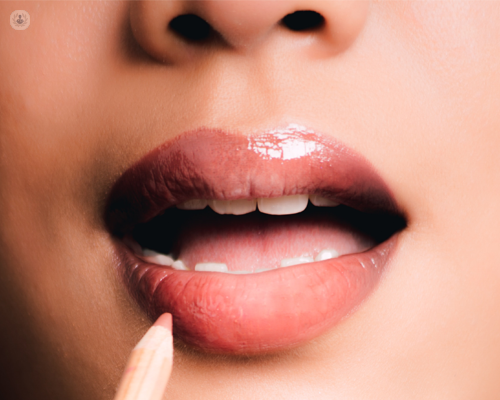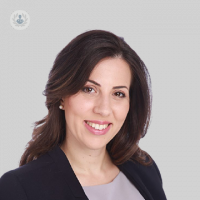Lip augmentation: getting the lips you love
Escrito por:If you are considering a lip augmentation, you will see there are different procedures available to get the fuller lips you dream of. Which is the best for you? Esteemed consultant plastic and reconstructive surgeon Ms Nefer Fallico, who practises in London, outlines and compares the procedures. She explains what the procedure involves, risks to be aware of, and cost.

What types of lip augmentation options are available?
There are two types of lip augmentations; non-surgical and surgical. Non-surgical augmentation is a temporary hyaluronic acid filler to increase the volume of the lips that will wear away over a period of time.
During a surgical augmentation, either the patients' lips are injected with their own tissue or a silicone lip implant is inserted. If the patient’s own tissue is being used it can be either from their fat tissue, a procedure called fat grafting or lipofilling, or from their pre-existing scar; in the case of a patient with a cleft lip and palate the tissue would be taken from the alveolar bone grafting donor site over the iliac crest (hip), a procedure called dermal fat grafting.
What is involved in each procedure?
A lip filler procedure lasts between 10 to 20 minutes, during which a topical local anaesthetic cream is applied to the lips before they are injected with hyaluronic acid filler. This procedure takes place in an outpatient clinic. For a day or two following the procedure it is normal to experience swelling and/ or bruising.
Lipofilling is a day surgery procedure, that takes about 20 to 40 minutes, performed either under sedation or general anaesthetic. A small amount of fat tissue is taken from a donor site, typically the abdomen, and injected into the lips, through a small incision at the corner of the mouth where the two lips meet. The point of entry on the lip will be closed up with resorbable sutures, stitches that the body will eventually reabsorb. Patients should be aware that up to half of the volume may be lost over time as the fat is partially reabsorbed into the body.
Similarly, dermal fat grafting is a day procedure, lasting roughly 30 to 40 minutes, also performed under sedation or general anaesthetic. In this instance, however, the lip is augmented by inserting a strip of tissue obtain from a patient’s scar into the lip, also with an access from the corners of the mouth. This procedure can also be tailored to correct small lip asymmetries. Wounds at the corners of the mouth are closed with resorbable sutures and it is possible that the graft can be partially reabsorbed, reducing the final volumising effect.
Silicone implants are inserted likewise as a day surgery procedure that lasts 20 to 30 minutes performed under sedation or general anaesthetic, with the wounds stitched up with resorbable sutures at the corners. A small pocket is created in the lip where the silicone lip implant is then inserted. As there is no resorption, the size is defined before insertion and cannot be adjusted to correct lip asymmetries. Risks to be aware of before a lip implant procedure include infection, extrusion, and capsular contracture.
How long does lip augmentation last?
Lip filler is temporary and lasts anywhere from six to twelve months. The surgical options are considered to be longer-lasting, however, if significant resorption occurs, further sessions may be necessary to achieve the desired appearance.
What does it feel like after the procedure?
A few hours following the procedure, the patients’ lips will be numb because of the local anaesthetic, which patients should be cautious of when eating and drinking hot things. Swelling and bruising can also occur up to a week after the procedure. The lips may be tender for a few days after the procedure.
Can you get permanent lip augmentation? Are there risks involved?
Permanent lip fillers are illegal. However, the aforementioned surgical options will yield permanent results. Indeed, patients should be made aware of the resorption rate in the instance of grafts, but what tissue doesn’t get resorbed, remains permanently. Risks to be aware of, when undergoing any lip augmentation include; a risk of infection, bleeding/bruising, over or under correction, skin or mucosal necrosis, and the previously mentioned risks of silicone implants.
How much does lip augmentation cost?
The price difference in procedures is quite large. Lip fillers, which are temporary, cost approximately £250. Surgical augmentation, either fat or dermal fat grafting, will cost in the region of £1000 to £1500. Silicone lip implants cost £2000 per lip.
If you are interested in booking a consultant with Ms Nefer Fallico, you can do so by visiting her Top Doctors profile today.


